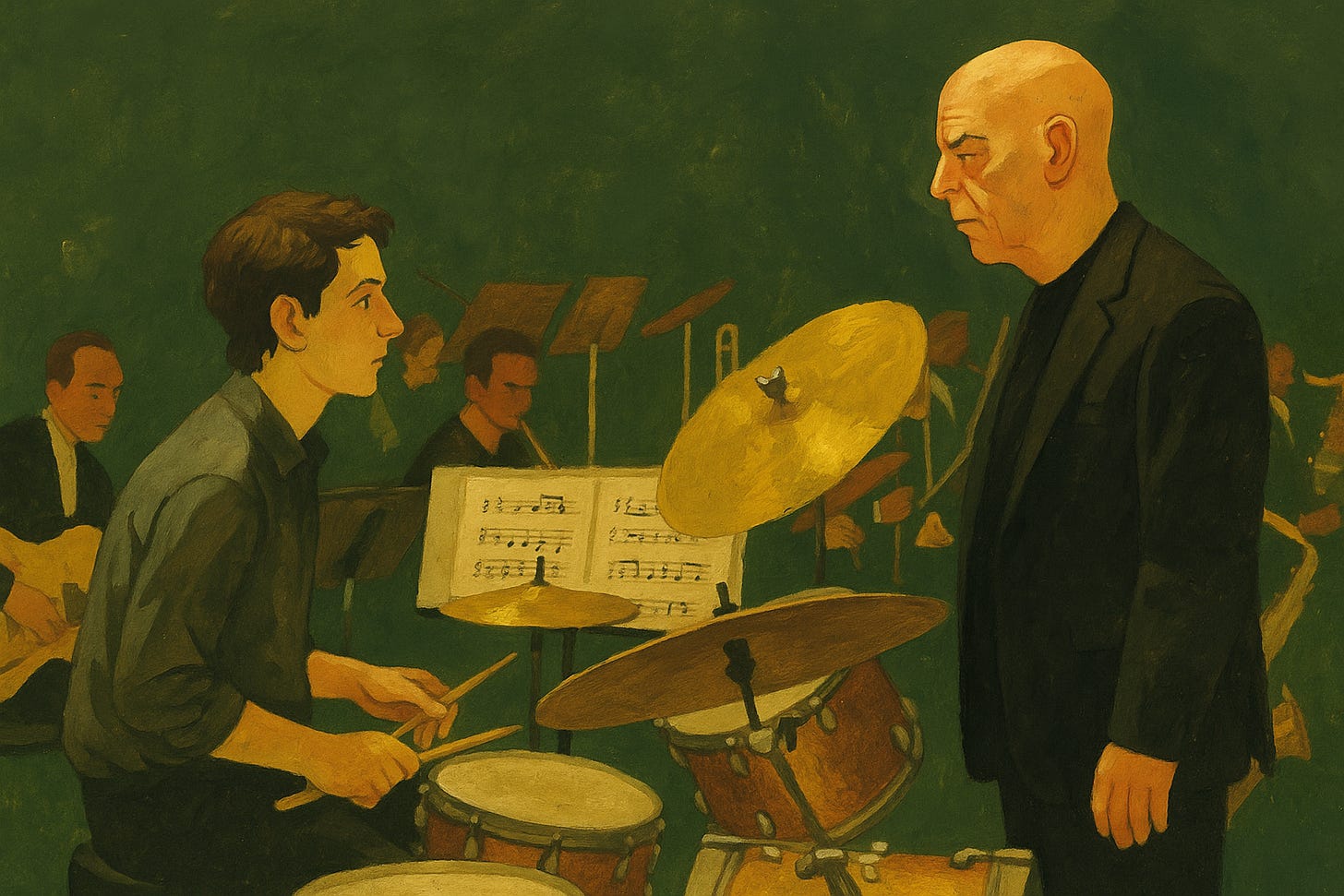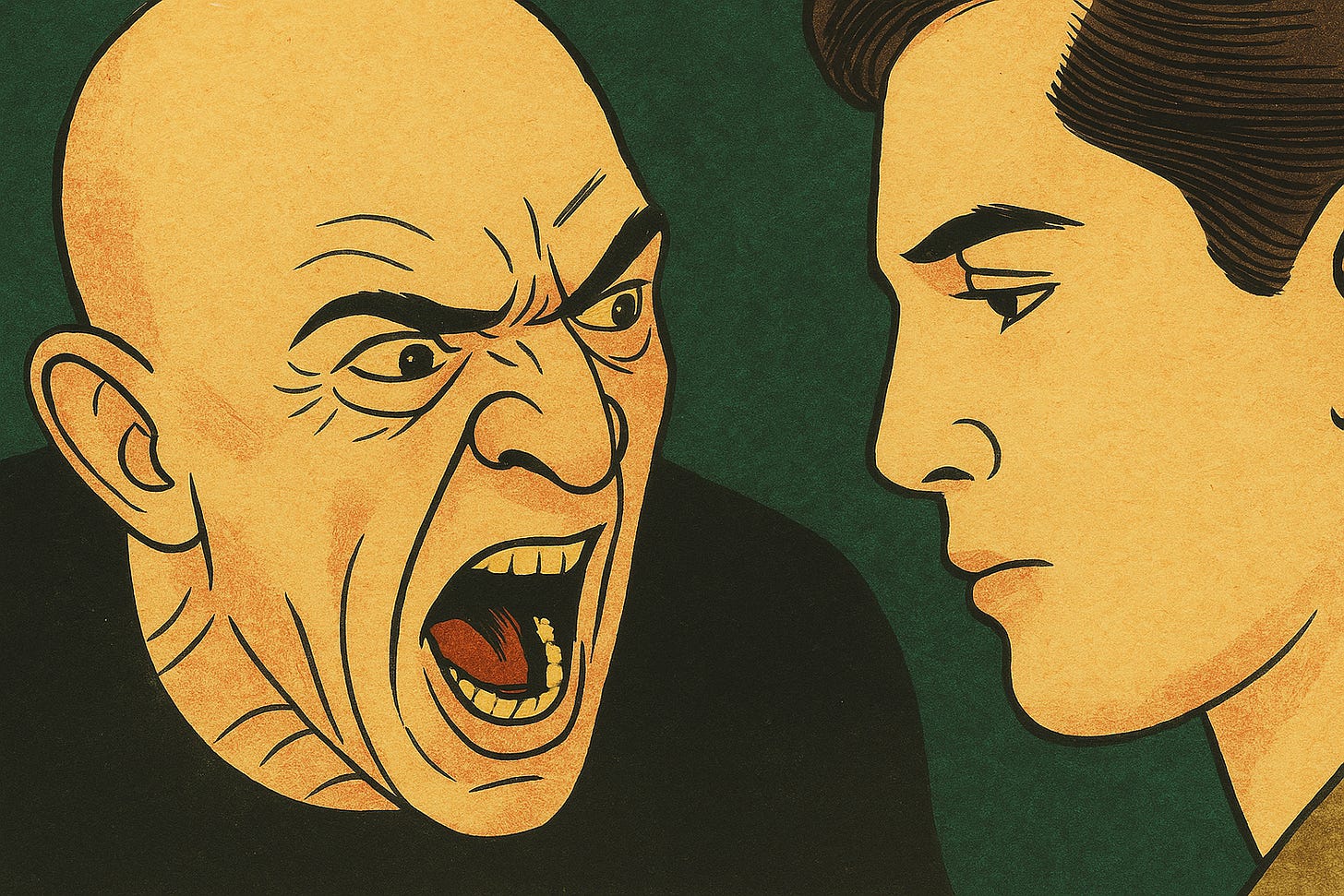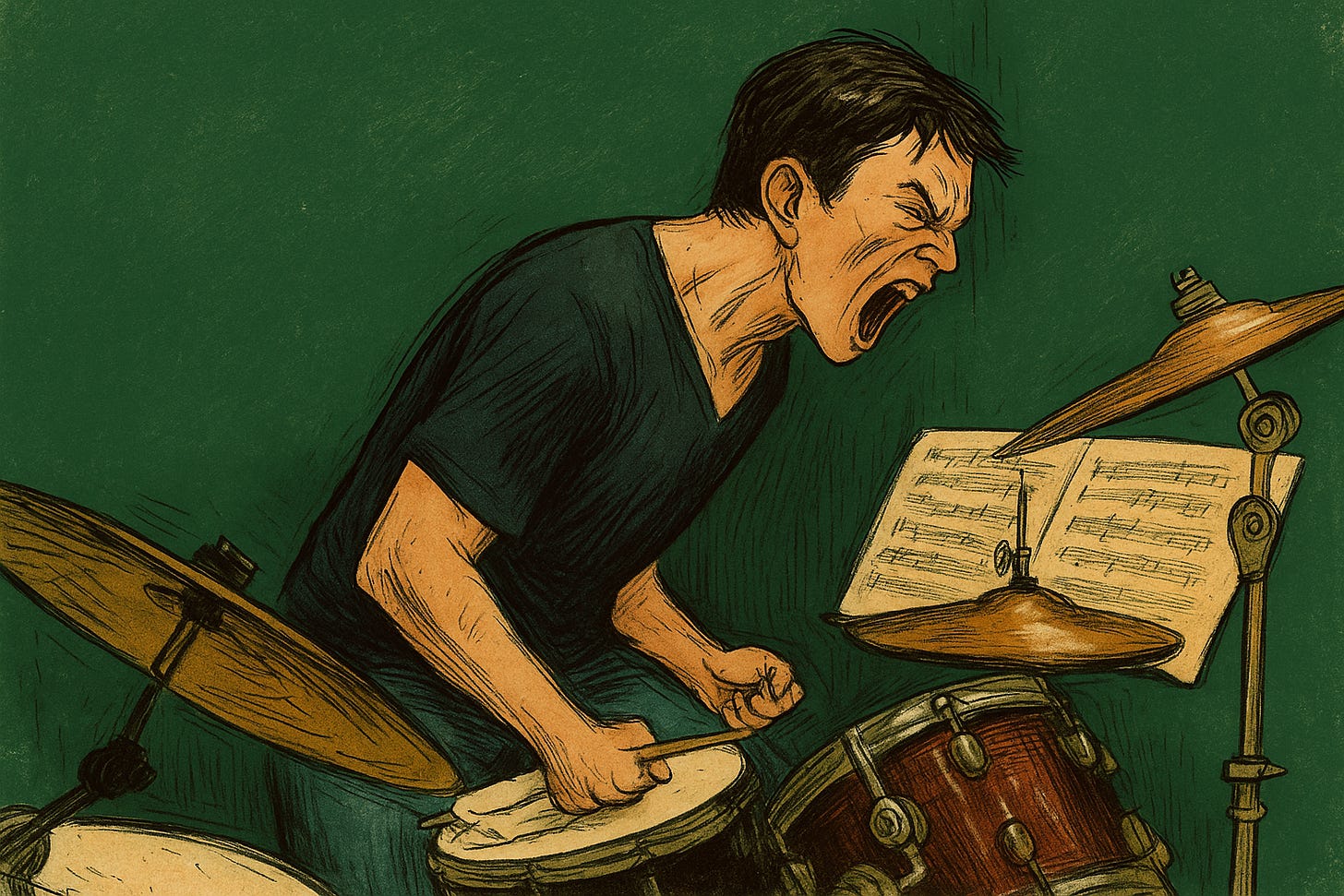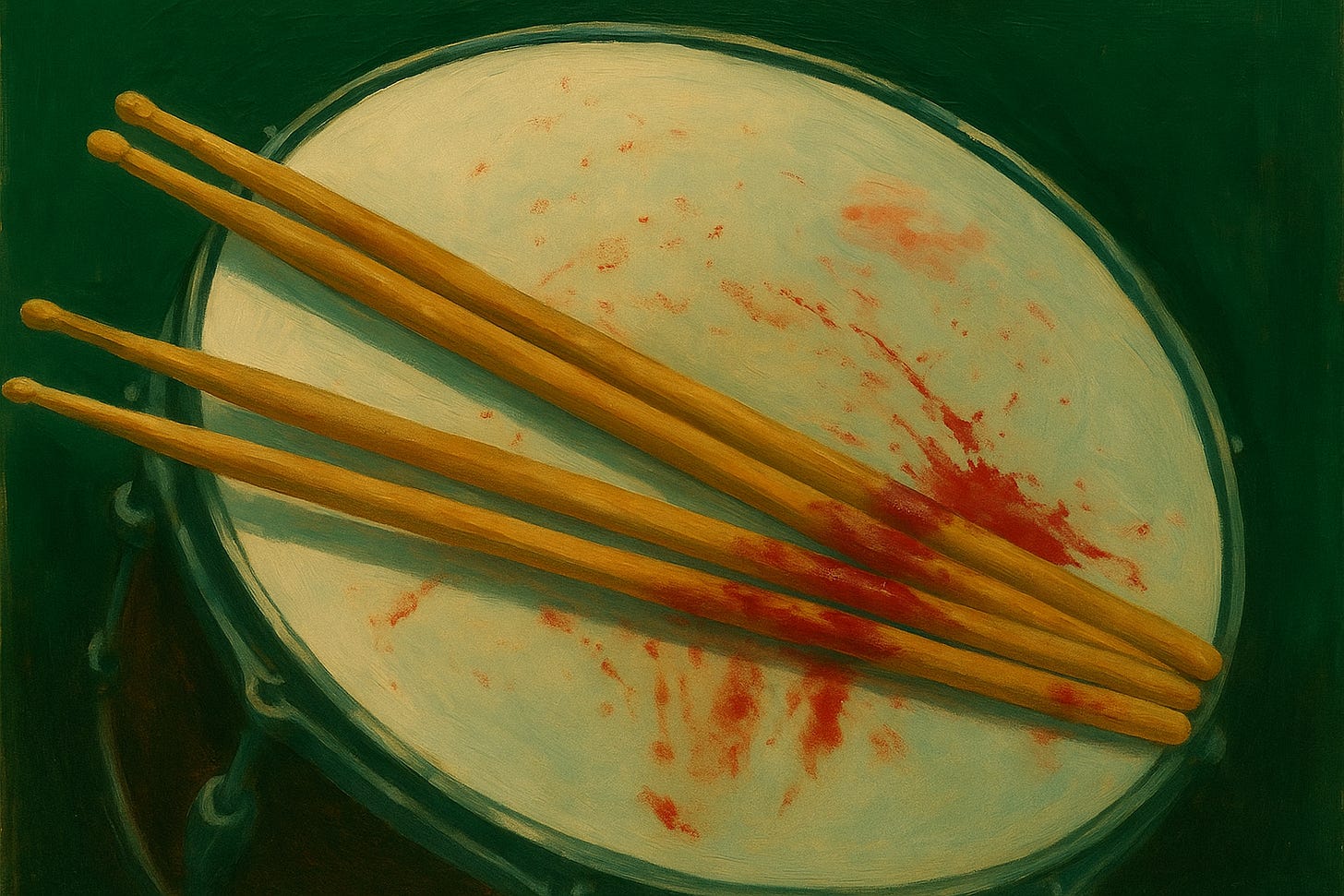Were You Rushing or Were You Dragging?
The danger of undirected ambition becomes most apparent in our modern culture of productivity obsession.
In Damien Chazelle’s 2014 film Whiplash, a scene exists that is so visceral and psychologically brutal, it has become emblematic of the destructive potential of misdirected ambition. The protagonist, Andrew Neiman, a young jazz drummer, sits behind his kit during a rehearsal under the tyrannical gaze of Terence Fletcher, his conductor at the prestigious Shaffer Conservatory.
Fletcher stops the band abruptly and asks Andrew a deceptively simple question: “Were you rushing or were you dragging?” Andrew hesitates, uncertain. Fletcher asks again, his voice sharp as a blade.
Andrew guesses: “Rushing?” Fletcher’s face contorts with rage. “So you do know the difference!” He hurls a chair across the room, slaps Andrew repeatedly, and demands he play the same section again and again until his hands bleed onto the drumheads.
This scene is brutal. It represents something more profound about the nature of ambition itself. Andrew possesses enormous drive: he practises until his hands are raw, he sacrifices relationships, and he pushes his body beyond reasonable limits.
Yet in this crucial moment, he cannot answer the fundamental question about his own performance. He has ambition in abundance, but he lacks the precision of direction that would make that ambition meaningful.
He is moving, certainly, but he does not know if he is moving correctly. And therein lies the tragedy: ambition without direction is not merely useless. It is dangerous.
The brilliance of Fletcher’s question lies in its binary cruelty. There are only two wrong answers: rushing or dragging. Both represent failure, yet they are opposite failures. Andrew cannot be both simultaneously, yet without clear direction, he might as well be both.
His frantic practice sessions, his desperate desire to be “one of the greats,” his willingness to endure abuse, all of it becomes meaningless if he cannot discern whether he is ahead of or behind the beat. Ambition has driven him to the drum kit, but only direction can tell him how to play it.
This principle extends far beyond jazz drumming.
Throughout history, we see countless examples of talented, driven individuals whose ambition, untethered from clear direction, led them astray or left them exhausted without achieving their goals.
Think of the difference between motion and progress, between activity and accomplishment. Many people confuse the former with the latter, believing that because they are busy, they must be making progress. But as the saying goes, “If you don’t know where you’re going, any road will take you there.” Or worse, no road will take you anywhere meaningful at all.
The writer Franz Kafka exemplifies this tension between ambition and direction in a more profound manner. Kafka worked as an insurance officer by day and wrote feverishly by night, driven by an undeniable compulsion to create.
Yet he was plagued by doubt about the direction of his work, unsure of its value, uncertain of its destination. His ambition to write was unquestionable: he produced some of the most influential literature of the twentieth century.
However, his lack of clear direction was evident in his famous instruction to Max Brod to burn all his manuscripts upon his death.
Kafka had the ambition to create but lacked confidence in the direction his creation should take or whether it should exist at all. Fortunately, Brod ignored these instructions, recognising that Kafka’s ambition, even when directionless to its creator, had produced work of immense value.
As Kafka himself wrote in his diaries, “A non-writing writer is a monster courting insanity.”
His ambition demanded expression, but without clear direction, it became a source of torment rather than fulfilment.
Ernest Hemingway, by contrast, demonstrates what happens when ambition finds its direction. Hemingway’s famous advice to writers reveals his understanding of this principle: “All you have to do is write one true sentence. Write the truest sentence that you know.”
This is direction.
Not vague ambition to “be a great writer” but a specific, actionable target: one true sentence. Then another. Then another.
Hemingway’s ambition was enormous: he wanted to revolutionise American prose. But he channelled it through the precise direction of clarity, truth, and simplicity.
Each sentence became a drumbeat, and he knew exactly whether he was rushing or dragging because he had defined what the correct tempo meant for his work.
The danger of undirected ambition becomes most apparent in our modern culture of productivity obsession. We are surrounded by people who are busy but not productive, active but not effective.
They attend every networking event but build no meaningful relationships. They read every self-help book but implement no lasting changes. They work long hours but accomplish little of significance.
Annie Dillard, in her meditation on writing and living, The Writing Life, captures this perfectly: “How we spend our days is, of course, how we spend our lives.”
If our days are filled with undirected ambition, with rushing and dragging simultaneously, with motion mistaken for progress, then our lives will amount to the same confusion.
Direction transforms time into accomplishment; without it, ambition merely transforms energy into exhaustion.
The solution is not to abandon ambition.
Andrew Neiman’s drive, properly directed, could make him a great drummer. Kafka’s compulsion to write, despite his doubts, produced The Metamorphosis and The Trial.
The solution is to constantly ask ourselves Fletcher’s question: “Were you rushing or were you dragging?”
Not as a form of self-abuse, but as a form of self-awareness. Are we ahead of where we should be, cutting corners in our haste? Are we behind where we should be, procrastinating or lacking focus?
The question demands honesty about our current position relative to our goals.
We must define what “the beat” is for our own lives. What is the tempo we are trying to match? What does success actually look like, specifically?
Vague dreams of greatness serve us no better than Andrew’s vague sense that he should be a great drummer. We need to know: What does greatness mean in concrete terms? What does progress look like today, this week, this year?
In the final analysis, Fletcher’s question is cruel, but it clarifies. It strips away the comfortable delusion that effort equals achievement, that ambition alone is sufficient. The tragedy of Whiplash is not that Andrew lacks talent or drive: he has both in abundance.
The tragedy is that he has surrendered his direction to a monster who uses his ambition to fuel abuse rather than growth.
The ultimate achievement of the film’s ending, regardless of one’s interpretation, is that Andrew finally finds his own tempo and direction. He stops waiting for Fletcher to tell him if he is rushing or dragging and starts to feel it himself.
Ambition is the engine, but direction is the steering wheel. Without both, you are not driving: you are just burning fuel.
The question “Were you rushing or were you dragging?” should haunt us not as a source of anxiety but as a call to precision, to self-knowledge, to the integration of our energy with our purpose.
Only then does ambition transform from a force that exhausts us into a force that elevates us. Only then do we stop being, as Hemingway might say, monsters courting insanity, and become instead artists of our own lives, playing exactly on beat.







